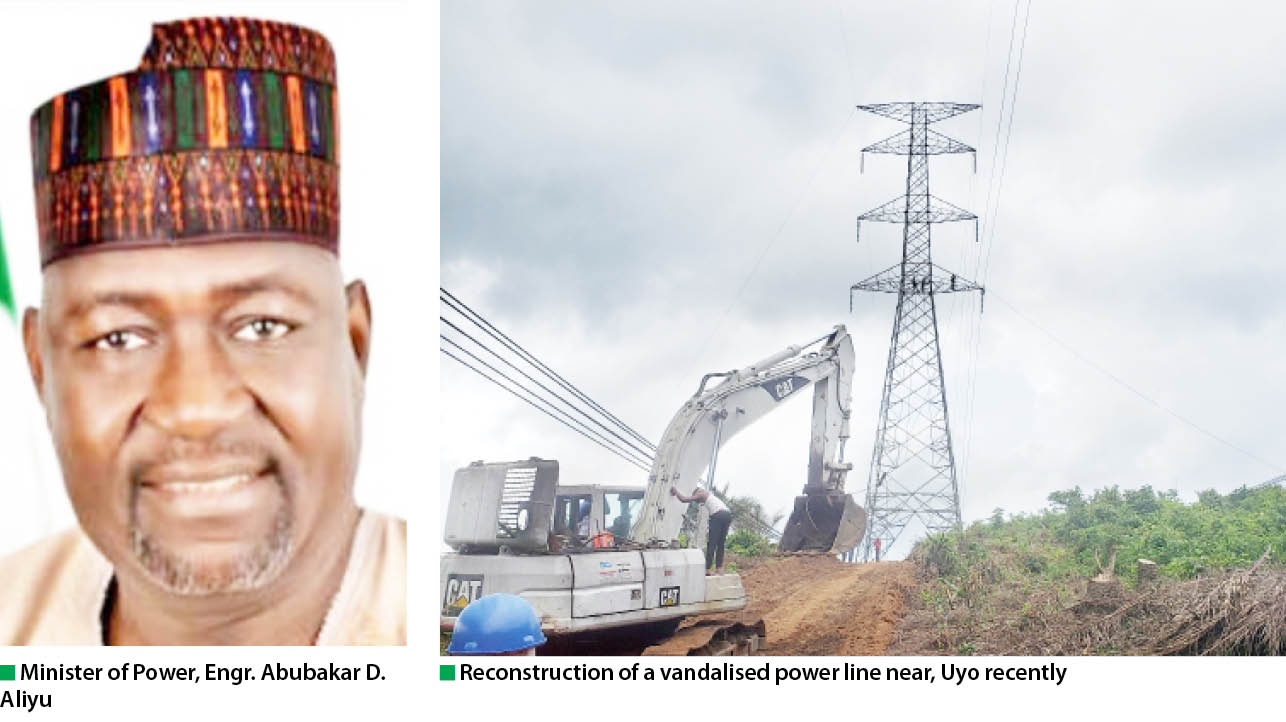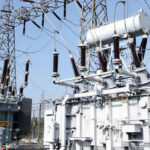As Nigerians express high hopes of having a national grid that can deliver 10,000 megawatts (MW) of electricity by 2023, the incessant vandalism of power transmission infrastructure could hamper this target. In this piece, Daily Trust on Sunday chronicles cases of vandalism of power transmission lines in recent times, which affected national grid operations.
On April 8, 2022, at about 6.30 pm, the national power grid plunged to a very low level, causing system collapse. Immediately after this happened, the management of the Transmission Company of Nigeria (TCN) swung into action and found that a transmission tower, number 104 at Oku Iboku in Akwa Ibom State, along the 330 kilovolts (kv) Ikot Ekpene to Odukpani transmission line, was vandalised and it fell.
Know your diabetes status, FG urges Nigerians
Nigeria host to 3.2m displaced persons – UN
But that was not the first in a space of three months. In March 2022, it was discovered that the 330kv Sapele to Benin transmission line tripped off after a series of vandalism affected some towers under it.
An official of the TCN, which manages the power grid, also confirmed that a tower on the 132kv Enugu to Benue transmission line was hacked and nearly fell. During the process, a suspected vandal was electrocuted.
The TCN immediately fixed the line to avoid it affecting the national grid.
Just near Osogbo in Osun State, vandals brought welding machines, hacked and fell two towers on the brand new 330kv Osogbo to Akure power transmission line, causing delay in the project execution.
And in Ogun State, three transmission towers collapsed recently on the 132kv Papalanto/Ojere double-circuit transmission line after they were vandalised, causing power outage around Abeokuta and its environs.
Again, the TCN quickly moved and fixed the constraint while restoring bulk power to the affected area.
Within this short period, at least five vandalism incidents have been recorded, with the one occurring in Oku Iboku (Akwa Ibom State) affecting Akwa Ibom and Cross River at once, while causing the Odukpani NIPP Generation Company (GenCo) with over 400MW capacity to shut down since April.
With a leading voice to address the energy crisis after the Oku Iboku vandalism, the Minister of Power, Abubakar D. Aliyu, an engineer, in a statement, directed the Nigerian Electricity Regulatory Commission (NERC) to probe the situation.
Shortly after, the NERC chairman, Sanusi Sanusi, an engineer, said, “The immediate cause of the national blackout (system collapse) was an act of vandalism on a transmission tower on the Odukpani-Ikot Ekpene 330kv double circuit transmission line, thus resulting in a sudden loss of about 400MW of generation (Calabar NIPP). This consequently led to a cascade of plants’ shut down across the country.”
Further explaining the nature of the vandalism, the Port Harcourt Regional Transmission Manager at the TCN, Daniel Udofia, an engineer, said tower 104 was vandalised at Oku Iboku on the 330kv Odukpani (Cross River) to Ikot Ekpene (Akwa Ibom) transmission line.
Shortly after the Oku Iboku vandalism, the Managing Director of the TCN, Dr Sule Abdulaziz, an engineer, and some management officials of the public-owned company, visited the site to assess the extent of damage.
Speaking at the site, he said, “This singular act threw the entire country into darkness, plus the humongous loss in terms of economic resources.”
Addressing pressmen, Abdulaziz said, “Despite this, we have remained resolute in our effort to find ways of ensuring power supply to the good people of Akwa Ibom and the country in general.
“To effectively achieve this, every citizen of Nigeria must in one way or another contribute to this fight against the vandalism of power infrastructures,” Dr Abdulaziz said.
However, more revelation of the nationwide power assets sabotage was made by the executive director, Transmission Service Provider at the TCN, Victor Adewumi, an engineer.
He said, “It is happening almost everywhere in the country now. Even in Delta State, we had to quickly mobilise to fix 10 towers in a row when we saw an act of vandalism. This is outright sabotage, and it doesn’t happen in other climes.”
But the worrying aspect of this was what Adewumi said about setting back Nigeria from the path of electricity expansion. He said, “We appeal to the youth and Nigerians to own these assets because it belongs to us. Each time, we pull the government back and we turn around to blame the same government. It is very unfair to throw the whole country into blackout.”
Adewumi, who said vandalism caused retrogression in power infrastructure development, added, “There is no way this country can move forward if each time we take a step forward, we take three backward. Everybody needs power, and every generation plant services every part of Nigeria. You can see how callous people can be to deliberately remove tower members to bring this thing down.”
The TCN management’s submission about how vandalism in power infrastructure causes retrogression in the national electricity grid development is factual and strong. For instance, Nigeria currently operates a grid that has an average of 5,000MW power delivery capacity. To accelerate this and resolve the myriad of complaints about poor power supply, the Nigerian government under President Muhammadu Buhari entered a strategic deal with Germany to have its Siemens undertake end-to-end energy reform for Nigeria under the Presidential Power Initiative (PPI).
That programme is ongoing, with the procurement of transmission and distribution equipment at an advanced stage and would kick in practically this September towards moving the grid from 5,000MW to 7,000MW.
By next year, it would take the grid to 10,000MW and by 2025. The programme would have lifted Nigeria’s grid to 25,000MW with its implementation being driven by the FGN Power Company.
As the TCN re-energises the Ikot Ekpene to Odukpani transmission line in Akwa Ibom after reconstructing the vandalised tower after four weeks, Adewumi, who assessed the completed work, has appealed to Nigerians to work to safeguard power assets in their communities.
He stated that the restoration of the power line was a priority for the Minister of Power, Abubakar D. Aliyu, and noted that power evacuation of at least 400MW from the Odukpani power plant near Calabar would create relief for the areas that experienced outage after the line was vandalised.
He said, “As we speak, the Odukpani NIPP has the capacity to bring over 400MW to the grid, but it was shut out because there was no other way to connect to the national grid due to vandalism.”
During the reconstruction of the vandalised tower, it was discovered that the vandals touched a few other towers too. Adewumi said, “This is not the only tower that has been vandalised, others were also touched. It is just that this one came down.”
Adewumi appealed to the public, especially residents of Akwa Ibom and parts of Cross River State, to take ownership of the structures, adding that the company was fast tracking the process.
“The tower is back and we have done everything to restore and sustain it on the national grid. We appeal to people to also take ownership of power infrastructures that pass through their communities,” he noted.
FG, states need more synergy, policing – Experts
To tackle the situation, some experts have insisted that the government, power operators, community residents and security agents should deepen synergy to intercept vandals before they execute their acts.
The Akwa Ibom State commissioner for power and petroleum development, John Etim, said the government would work with the TCN on mass sensitisation of the public while making laws at the House of Assembly for stricter penalties against vandals. He also said the state had intensified security surveillance to curb vandals’ activities.
Mr Bulus Yaro, a power consultant, said he was aware that some power firms occasionally engaged the Nigerian Security and Civil Defence Corps (NSCDC) and vigilante groups to patrol lines.
“These efforts are not enough, from time to time, community members, including youths, should be involved in the process.
“Then security agents should be made to arrest and prosecute dealers in metal scraps, especially if they are found to be copper and aluminium conductors. That is when we will start being serious to tackle this sabotage,” Yaro said.

 Join Daily Trust WhatsApp Community For Quick Access To News and Happenings Around You.
Join Daily Trust WhatsApp Community For Quick Access To News and Happenings Around You.


